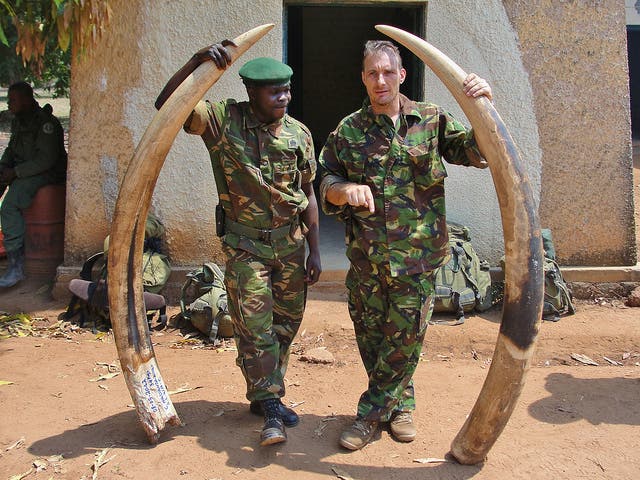Park rangers risk their lives on a daily basis to protect wildlife from poachers. They’re also underfunded and understaffed, so allocating resources as efficiently as possible is critical. This is where artificial intelligence, big data, machine learning, and game theory come in.
The A.I. can identify and predict poaching patterns, and adapts in time so that park patrols can transition from “reactive” to “proactive” control. Pilot programs launched in Uganda and Malaysia have so far been successful, and a similar system is currently being developed for illegal logging.

Elephant ivory seized from poachers in Garamba. Credit: Flickr Enough Project
The AI-driven system was developed by researchers at the University of Southern California (USC). Aptly named Protection Assistant for Wildlife Security (PAWS), the A.I. essentially plays “green security games”, or game theory for wildlife protection.
Game theory is “the study of mathematical models of conflict and cooperation between intelligent rational decision-makers.” It’s mainly used in economics and psychology to predict outcomes, but game theory can work just as well wherever coordinated human activity is involved. Previously, similar methods were used by the Coast Guard and Transporation Security Administration to improve airport and waterway security.
Using data like patrol activity and poaching signaling, PAWS can plan which routes rangers need to follow to maximize poacher apprehension or minimize wildlife risk. What makes it particularly practical is that it also incorporates topographical data, so the plotted routes actually make sense. Rangers are also directed on patrol routes that minimize elevation changes — this saves time and energy.
As PAWS is fed more data, it becomes better at predicting the best outcomes against poaching. Since PAWS was implemented in Uganda and Malaysia in 2014, authorities report more observations of poaching activities per square kilometer. To make things more interesting, PAWS also randomizes routes so poachers can’t learn to avoid which routes to avoid.
“This research is a step in demonstrating that AI can have a really significant positive impact on society and allow us to assist humanity in solving some of the major challenges we face,” said USC’s Milind Tambe, professor of computer science and industrial and systems engineering.
PAWS can be fitted to combat all sorts of illegal activities, like logging. Since 2015, two NGOs in Malaysia have been using PAWS to protect the nation’s forests.
The team recently combined PAWS with a new tool called CAPTURE (Comprehensive Anti-Poaching Tool with Temporal and Observation Uncertainty Reasoning) that predicts attacking probability even more accurately.
“There is an urgent need to protect the natural resources and wildlife on our beautiful planet, and we computer scientists can help in various ways,” said Fei Fang, a Ph.D. candidate in the computer science department at the University of Southern California (USC). “Our work on PAWS addresses one facet of the problem, improving the efficiency of patrols to combat poaching.”
Such solutions are impressive and much needed. There are only 3,200 tigers left in the world, down from more than 60,000 a century ago. Elephants, rhinos and scores of other wild animal species are threatened by extinction due to poaching. Meanwhile, illegal loggers harvest timber worth as much as $100 billion each year. This undermines economies, destroys habitats and further exacerbates a global problem. Like before, technology is here to help solve complex problems.









